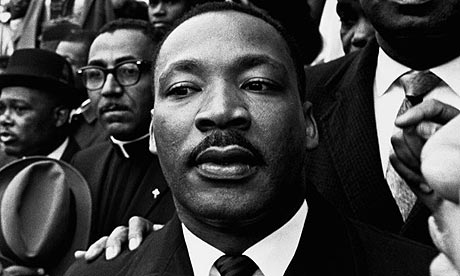The three remaining presidential candidates today invoked the memory of Dr Martin Luther King, Jr, who was killed by an assassin's bullet 40 years ago, stressing the need to continue the work left incomplete by the slain civil rights hero, and recalling his example of moral courage.
Republican John McCain - who today apologised for once voting against establishing a national holiday in King's honour - and Democrat Hillary Clinton spoke in Memphis, at venues closely associated with King's legacy. The trip was particularly key for Clinton, who has seen black voters flock in droves to her rival Barack Obama.
Obama, the first serious black presidential contender in the nation's history, spoke not in majority-black Memphis but from virtually all-white Fort Wayne, Indiana, where he denounced "a politics that's used race to drive us apart, when all this does is feed the forces of division and distraction, and stop us from solving our problems".
The Illinois senator sought to associate himself with King's struggle for racial and economic justice, which he said "remains an unfinished part of the King legacy".
"That is why the great need of this hour is much the same as it was when Dr King delivered his sermon in Memphis," Obama said.
"We have to recognise that while we each have a different past, we all share the same hopes for the future – that we'll be able to find a job that pays a decent wage, that there will be affordable health care when we get sick, that we'll be able to send our kids to college, and that after a lifetime of hard work, we'll be able to retire with security. They're common hopes, modest dreams. And they're at the heart of the struggle for freedom, dignity, and humanity that Dr King began, and that it is our task to complete."
At the Mason Temple in Memphis, where King spoke on the eve of his murder, Clinton pledged to appoint a "poverty czar" who would fix the nation's attention on the plight of the underprivileged.
She spoke of shaking King's hand in Chicago as a 14 year-old girl who lived in an all-white neighbourhood and attended an all-white school.
"Because of him, after 219 years and 43 presidents who have been white men, this next generation will grow up taking for granted that a woman or an African American can be president of the United States of America," she said.
"But as far as we have come, we know the journey is far form over. Some days when you open up the newspaper and you read the headlines, it feels like we have tumbled right back down that mountaintop."
McCain spoke this morning at the National Civil Rights Museum, located at the former Lorraine Motel where King was assassinated. He addressed the Southern Christian Leadership Conference, a 51-year-old civil rights organisation of which King was a founder and president.
McCain once voted against establishing a national holiday in King's honour, and apologised today for what he called a mistake.
"Even in this most idealistic of nations, we do not always take kindly to being reminded of what more we can do, or how much better we can be, or who else can be included in the promise of America," he said.
"We can be slow as well to give greatness its due, a mistake I made myself long ago when I voted against a federal holiday in memory of D. King. I was wrong and eventually realised that, in time to give full support for a state holiday in Arizona."
The Republican nominee told of first hearing of King's assassination while a prisoner of war in north Vietnam, and of how his captors calculated the news would demoralise him and his comrades.
"Doubtless it boosted our captors' morale, confirming their belief that America was a lost cause, and that the future belonged to them," he said. "Yet how differently it all turned out. And if they had been the more reflective kind, our enemies would have understood that the cause of Dr King was bigger than any one man, and could not be stopped by force of violence."
Obama has in large part sought to portray himself as post-racial, and plays down his historical role as the most emergent black presidential candidate in US history.
Meanwhile, the Clinton campaign has been accused of injected ugly racial strife into the campaign.
Former president Bill Clinton came under fire for appearing to belittle Obama's presidential bid by making comparisons to Jesse Jackson's failed campaigns and attempting to portray him as merely a black candidate who won't appeal to whites - Obama overturned that stereotype by winning huge margins in overwhelmingly white states in the midwest and west.
Last month, Clinton fundraiser and former vice presidential candidate Geraldine Ferraro suggested that Obama has been successful only because he is black.
Videos of Obama's former preacher Jeremiah Wright denigrating the US have also added to the racial tensions. Some white voters have said they were turned off by his fiery rhetoric and said they wondered why Obama remained a part of the church.
The US congressman representing Memphis, Stephen I Cohen, has endorsed Obama, although Tennessee governor Phil Bredeson remains neutral.








